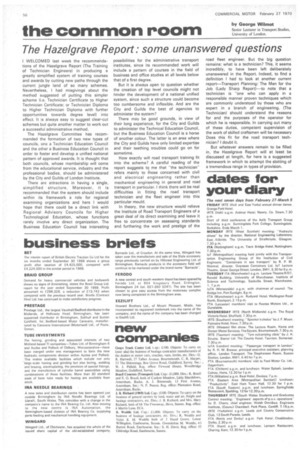The Haze/grave Report: some unanswered questions
Page 58

If you've noticed an error in this article please click here to report it so we can fix it.
I WELCOMED last week the recommendations of the Haze!grave Report (The Training of Technician Engineers) in producing a greatly simplified system of training courses and awards by cutting new paths through the current jungle land of so many schemes. Nevertheless, I had misgiving a about the method suggested of putting this simpler scheme (i.e. Technician Certificate to Higher Technician Certificate; or Technician Diploma to Higher Technician Diploma with further opportunities towards degree level) into effect. It is always easy to suggest clear-cut schemes but quite another matter to work out a successful administrative method.
The Haze'grave Committee has recommended the formation of two new types of councils, one a Technician Education Council and the other a Business Education Council in order to foster and develop a unified national pattern of approved awards. It is thought that both councils, whose membership will come from the educational service, industry and the professional bodies, should be administered by the City and Guilds of London Institute.
There are attractions in having a single, simplified structure. Moreover, it is recommended that the system should include within its framework a role for regional examining organizations and here I would hope that there could be a direct link with Regional Advisory Councils for Higher Technological Education, whose functions rarely involve any direct organization. The Business Education Council has interesting possibilities for the administrative transport institutes, since its recommended work will include a pattern of courses in the field of business and office studies at all levels below that of a first degree.
But it is always open to question whether the creation of top level councils might not hinder the development of a national unified system, since such a structure could become too cumbersome and inflexible. And are the City and Guilds the best of agencies to administer the system?
There may be good grounds, in view of their long experience, for the City and Guilds to administer the Technical Education Council, but the Business Education Council is a horse of another colour. The latter is an area where the City and Guilds have only limited expertise and their teething troubles could go on for sometime.
How exactly will road transport training fit into the scheme? A careful reading of the report suggests to me that "the technician" refers mainly to those concerned with civil and electrical engineering rather than mechanical engineering in general and road transport in particular. I think there will be real difficulties in fitting the road transport technician and the fleet engineer into this particular mould.
In theory, the new structure would relieve the Institute of Road Transport Engineers of a great deal of its direct examining and leave it free to concentrate on assessing standards and furthering the work and prestige of the road fleet engineer. But the big question remains: what is a technician? This, it seems incredibly, to have been left deliberately unanswered in the Report. Indeed, to find a definition I had to look at another current report—Transport Planning: The Men for the Job (Lady Sharp Report)—to note that a technician is "one who can apply in a responsible manner proven techniques which are commonly understood by those who are expert in a branch of engineering. (The Technician) Should understand the reasons for and the purposes of the operator for which he is responsible. In carrying out many of these duties, competent supervision of the work of skilled craftsmen will be necessary Does this fit for the road transport technician? I doubt it.
But whatever answers remain to be filled in, the Hazelgrave Report will at least be discussed at length, for here is a suggested framework in which to attempt the slotting of a tremendous range in types of provision,




































































































